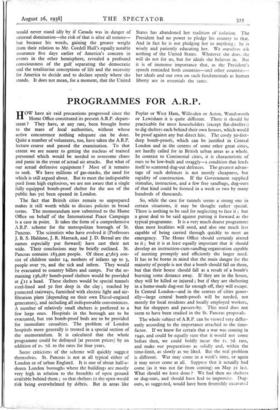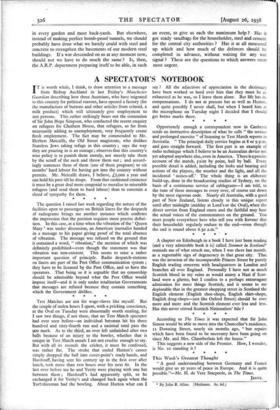PROGRAMMES FOR A.R.P.
HOW have air raid precautions progressed since the Home Office constituted its present A.R.P. depart- ment ? They have, at any rate, been brought home to the mass of local authorities, without whose active concurrence nothing adequate can be done. Quite a number of volunteers, too, have taken the A.R.P. lecture course and passed the examination. To that extent we are nearer to getting the nucleus of trained personnel which would be needed to overcome chaos and panic in the event of actual air attacks. But what of our actual defensive equipment ? Most of it remains to seek. We have millions of gas-masks, the need for which is still argued about. But to meet the indisputable peril from high explosives, we are not aware that a single fully equipped bomb-proof shelter for the use of the public has yet been opened in London.
The fact that British cities remain so unprepared makes it still worth while to discuss policies in broad terms. The memorandum now submitted to the Home Office on behalf of the International Peace Campaign is a case in point. It takes the form of a comprehensive A.R.P. scheme for the metropolitan borough of St. Pancras. The scientists who have evolved it (Professors J. B. S. Haldane, J. R. Marrack, and J. D. Bernal are the names especially put forward) have cast their net wide. Their conclusions may be briefly outlined. St. Pancras contains 183,90o people. Of these 47,613 con- sist of children under 14, mothers of infants up to 3, people over 70, and the sick and infirm. They would be evacuated to country billets and camps. For the re- maining 136,287 bomb-proof shelters would be provided at £11 a head. These shelters would be special tunnels steel-lined and 50 feet deep in the clay ; reached by protected stairways, furnished with electric light and air- filtration plant (depending on their own Diesel-engined generators), and including all indispensable conveniences. A number of relatively small shelters is preferred to a few large ones. Hospitals in the borough are to be evacuated, but ioo bomb-proof beds are to be provided for immediate casualties. The problem of London hospitals more generally is treated in a special section of the memorandum. It is calculated that the whole programme could be defrayed (at present prices) by an addition of is. 7d. to the rates for four years.
Some criticisms of the scheme will quickly suggest themselves. St. Pancras is not at all typical either of London or of urban England. It is one of about half-a- dozen London boroughs where the buildings are mostly very high in relation to the breadths of open ground available behind them ; so that shelters in the open would risk being overwhelmed by debris. But in areas like Poplar or West Ham, Willesden or Acton, Wandsworth or Lewisham it is quite different. There it should be practicable for most householders (except flat-dwellers) to dig shelters each behind their own houses, which would be proof against any but direct hits. The costly 50-feet- deep bomb-proofs, which can be justified in Central London and in the centres of some other great cities, are hardly called for in British urban areas as a whole. In contrast to Continental cities, it is characteristic of ours to be low-built and straggly—a condition that lends itself to scattered dug-out defences. The greatest advan- tage of such defences is not merely cheapness, but rapidity of construction. If the Government supplied stimulus, instruction, and a few free sandbags, dug-outs of that kind could be formed in a week or two by many hundreds of thousands.
So, while the case for tunnels seems a strong one in certain situations, it may be thought rather special. There is nothing to be said for neglecting to face it ; but a great deal to be said against putting it forward as the typical programme. It is a very much dearer programme than most localities will need, and also one much less capable of being carried through quickly to meet an emergency. The Home Office should certainly attend to it ; but it is at least equally important that it should develop an instruction-cum-sandbag organisation capable of meeting promptly and efficiently the larger need. It has to be borne in mind that the main danger for the majority of people is not that a bomb should fall on them, but that their house should fall as a result of a bomb's bursting some distance away. If they are in the house, they will be killed or injured ; but if they are sheltering in a home-made dug-out far enough off, they will escape. In Central London—and in the centres of cities gener- ally—large central bomb-proofs will be needed, not merely for local residents and locally employed workers, but for shoppers and passers-by. This need does not seem to have been studied in the St. Pancras proposals.
The whole subject of A.R.P. can be viewed very differ- ently according to the importance attached to the time- factor. If we knew for certain that a war was coming in 1940, and could be equally sure that it would not come before then, we could boldly incur the is. 7d. rate, and make our preparations as solidly and, within the time-limit, as slowly as we liked. But the real problem is different. War may come in a week's time, or again it may never come at all. Suppose that it actually had come (as it was not far from coming) on May 21, last. What should we have done ? We had then no shelters or dug-outs, and should have had to improvise. Dug- outs, as suggested, would have been feverishly excavated in every garden and most back-yards. But elsewhere, instead of making perfect bomb-proof tunnels, we should probably have done what we hastily could with steel and concrete to strengthen the basements of our modeth steel buildings. If a war descended on us at any moment now, should not we have to do much the same ? Is, then, the A.R.P. department preparing itself to be able, in such an event, to give us each the maximum help ? Has it got ready sandbags for the householder, steel and cement for the central city authorities ? Has it at all measured up which and how much of the defences should be completed in advance, without waiting for any war signal ? These are the questions to which answers seem most urgent.



































 Previous page
Previous page